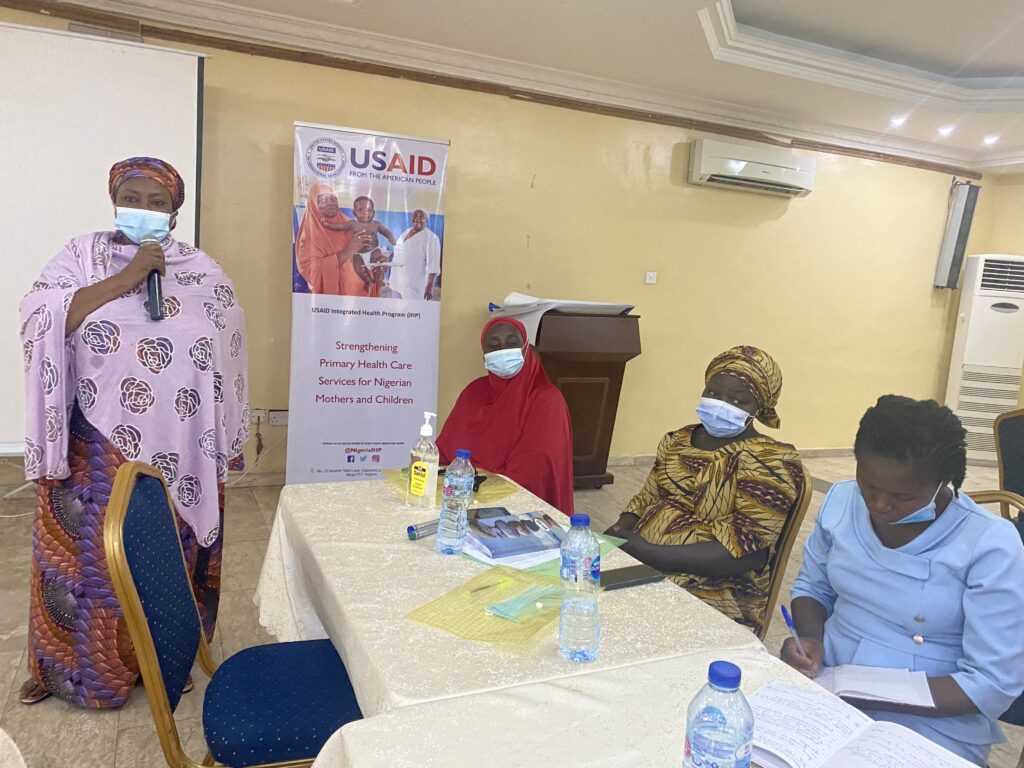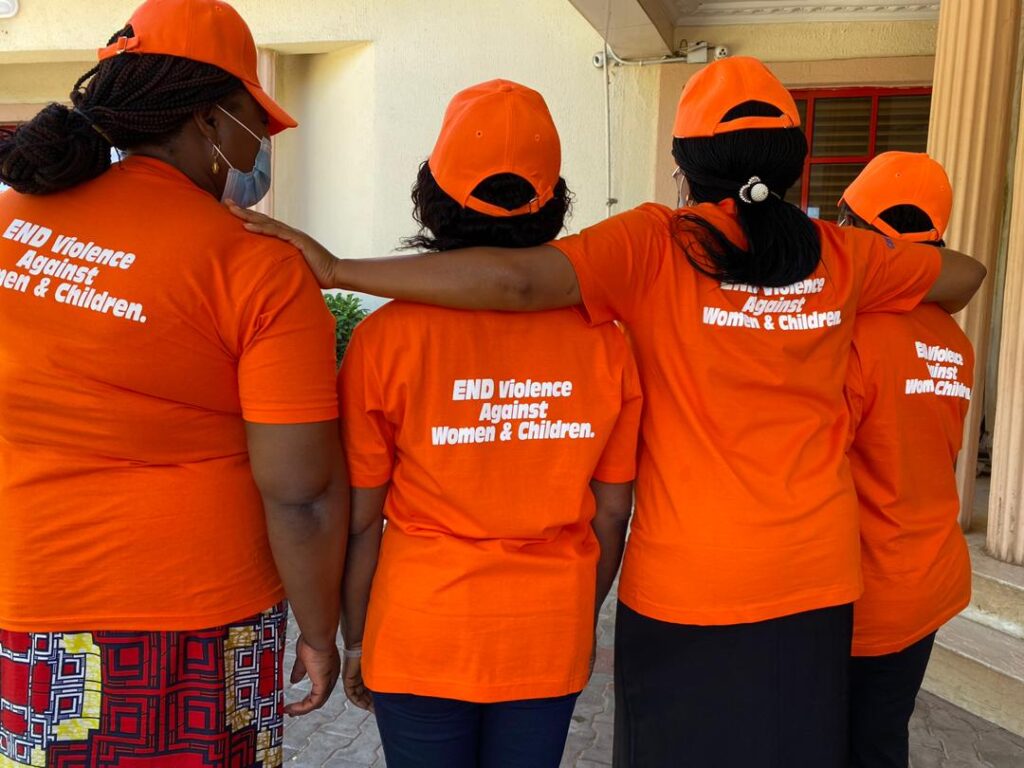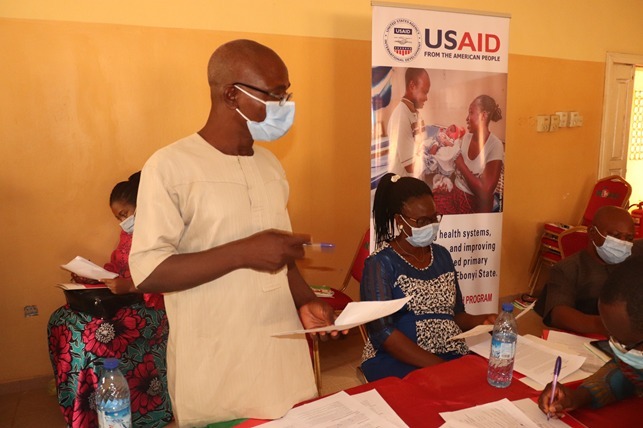Strategies for Engaging Stakeholders in Gender-Based Violence (GBV) Response and WI-HER’s Work on the USAID Integrated Health Program

By Sara Jane (SJ) Renfroe, WI-HER Senior Associate, and Lisa Bowen, WI-HER Program Manager; with contributions from Helen John, IHP GESI Advisor; Stella Abah, IHP GESI Advisor; Aisha Ahmed, IHP GESI Advisor; Emilia Eyo Okon, IHP GESI Advisor; Anne Kpason, IHP GESI Advisor; Maddison L. Hall, WI-HER Program Officer; Kenneth Goughnour, WI-HER Program Coordinator; Stella Mwita, WI-HER Regional Technical Advisor; Allison Annette Foster, WI-HER Former Vice President
GBV is defined by USAID as “any harmful threat or act directed at an individual or group based on actual or perceived sex, gender, gender identity or expression, sex characteristics, or sexual orientation, and/or lack of adherence to varying socially constructed norms around masculinity and femininity.”
Across Nigeria, there are concerningly high levels of gender-based violence (GBV). Nearly one in three Nigerian women have experienced physical violence, and almost one in 10 Nigerian women have experienced some form of sexual violence since 15 years old, according to the 2018 Demographic and Health Survey. GBV survivors face several obstacles to accessing support, including stigma associated with violence, fear of retaliation, inadequate service availability, lack of knowledge about available services, insufficient referral processes, and distrust in government systems.
Coordinated, multisectoral GBV response and prevention efforts are critical to addressing and mitigating the high incidence of GBV, inadequate levels of support for GBV survivors, and social norms that perpetuate violence. WI-HER, as a subcontractor for The Palladium Group, led the USAID-funded Integrated Health Program’s (IHP) efforts on GBV response, which focused on developing and implementing locally driven efforts centered in the health system. By analyzing WI-HER’s work on this project, we have identified successful strategies for engaging stakeholders in GBV response.
WI-HER’s Work on IHP

Prior to beginning other activities, WI-HER conducted Gender Equity and Social Inclusion (GESI) Desk Reviews, which identified traditional and cultural values around gender that could present barriers to stakeholder buy-in and challenges in advocating for issues related to GBV. Stakeholders, including government, NGO, and civil society organization (CSO) actors, held gendered beliefs that restricted women’s access to healthcare and finances and limited their agency. Additionally, the GESI Desk Reviews found that similar values prevented men from accessing healthcare services due to constructs of masculinity and taboos. To address these sociocultural determinants, WI-HER engaged stakeholders in discussions focused on GESI to generate awareness about the unacceptability of GBV and the need to address the barriers survivors experience in accessing care.
WI-HER tailored activities to the specific context of five participating states: Bauchi, Kebbi, Sokoto, Ebonyi, and FCT. In pursuit of IHP’s objectives, WI-HER’s GESI Advisors worked in coordination with IHP and other USAID implementing partners to engage and support key local actors who hold pivotal roles and profound influence within the spheres of health and community development. These local leaders informed, monitored, and provided ongoing support for a multisectoral and multi-level approach to GBV response across their respective states.
Strategies for Stakeholder Engagement
WI-HER utilized the following stakeholder engagement strategies for GBV response in Nigeria, which can be applied to other similar contexts:
Strategy 1: Sustained Advocacy Efforts in Coalition With Leaders

WI-HER’s GESI Advisors focused on sustained advocacy efforts in coalition with influential leaders, which included:
1) raising awareness on the importance of coordinated GBV response and prevention;
2) identifying point persons within the government agency or organization who are receptive to involvement in GBV response and prevention;
3) identifying local CSO partners and determining the organization’s level of commitment and resources available to contribute; and,
4) formalizing buy-in through memorandums of understanding between government bodies and CSO actors.
Moreover, engaging government entities in advocacy efforts in a capacity that promoted their ownership of the process drove policy change and resulted in government commitments for funding GBV response activities, including funding for Gender Action Plans and GBV-specific actions within approved Ministry of Health Annual Operating Plans.
Engaging key local leaders and CSOs throughout advocacy and activity planning enabled them to take the lead on activity implementation and positioned them to continue activities post-IHP closeout. One method for engaging these stakeholders was leveraging key opportunities for advocacy, such as international advocacy campaigns like the 16 Days of Activism against Gender-based Violence and observances like International Women’s Day.
Strategy 2: Prioritized Ongoing Multisectoral Coordination Through a GBV Task Force / Technical Working Group
WI-HER’s GESI Advisors supported GBV Task Forces and/or Technical Working Groups (TWGs) in each IHP-supported State to convene stakeholders, including civil society organizations, State-level government entities, and other international development implementing partners, at every level. The multisectoral GBV groups coordinated GBV response efforts and promoted ongoing learning and accountability via quarterly coordination meetings with members, outside stakeholders, and representatives of community-level stakeholders.
Engaging multisectoral stakeholders in GBV TWGs resulted in the establishment of GBV referral pathways; expansion of the GBV referral system to include Sexual Assault Referral Centres (SARC), which provide free medical and counseling services to GBV survivors; and institutionalization of the GBV TWGs to provide sustainable oversight and coordination of the referral network. Engaging local CSOs as partners in GBV response led to increased capacity of local actors and service providers, raised awareness about GBV in communities, and leveraged financial and human resources toward shared objectives.
Strategy 3: Addressed Sociocultural Barriers and Resistance Through Training & Values Clarification
WI-HER addressed sociocultural barriers and resistance through training health workers and facilitating ongoing Values Clarification & Transformative Activities. To address barriers, WI-HER worked through IHP to facilitate workshops and sensitization sessions for health workers at health facilities on topics such as understanding GESI, inclusivity in the workplace, GBV, gender and inclusive development, respectful maternity care, child protection, and safeguarding, among others.
WI-HER also supported trainings for health workers on screening and documenting GBV cases and making warm referrals. In coordination with GBV awareness and referral efforts for access to justice, WI-HER provided sessions on the provision of trauma-informed and comprehensive care to both health workers and law enforcement agencies and officers as a way to build capacity for trauma-sensitive approaches to interviewing victims.
Warm referral practices help survivors reach further care. A warm referral includes asking, “What would help most if we could do it now?” It includes helping survivors identify and consider referral and social support options and explaining how the referral service can meet their needs. The survivor should be given contact details (i.e. location, how to get there, and relevant names). A warm referral includes offering to help survivors make an appointment, or to call on their behalf, make a call with them, or offering a private place where they can call. Survivors should be assisted in solving any practical problems that might interfere – for example, no transportation, no childcare.
Engaging health workers and other relevant stakeholders as primary points of contact for victims of GBV led to an increase in GBV cases documented and greater support for survivors, including access to justice. Since the beginning of IHP through March 2024, IHP’s efforts to leverage the capacity of health workers and other stakeholders led to the documentation of 48,584 GBV cases, the provision of post-GBV care for 39,300 survivors, and the facilitation of 3,554 referrals for further support, including referrals for medical services, mediation and counseling, legal services, safe housing for minors and adults, and directing law enforcement to pursue perpetrators.
***
Through examining WI-HER’s work in Nigeria through USAID IHP, it is evident that stakeholder engagement in GBV prevention and response is essential to ensure GBV response is context-appropriate, addresses the community’s needs, and achieves the necessary buy-in for activity sustainability. While the strategies discussed above proved valuable in WI-HER’s work through USAID IHP in Nigeria and can be considered for use in other contexts, it is important to adapt these practices based on the specific context and needs of each community for GBV prevention and response.